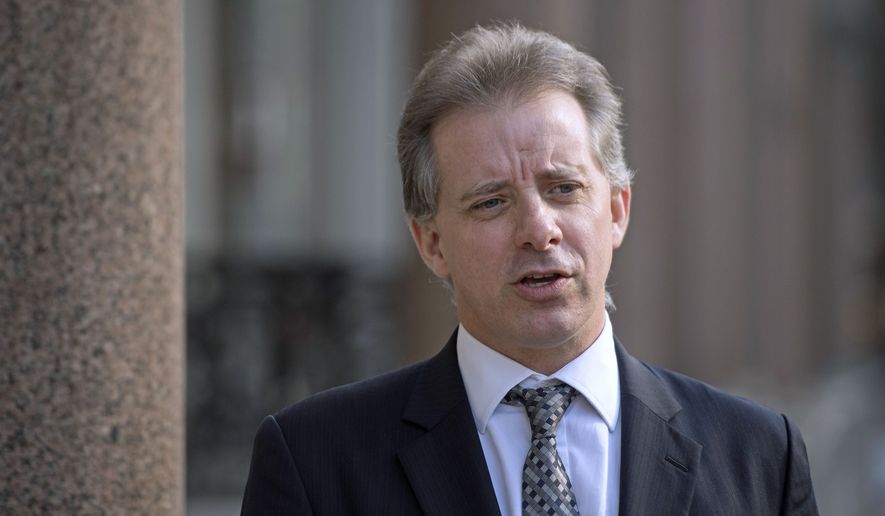OPINION:
It has taken too many years, but the infamous Steele dossier has been finally and thoroughly discredited, but not before inflicting great harm on our political process.
When I first learned retired British MI-6 Officer Christopher Steele had been hired to collect information on then-candidate Donald Trump on behalf of the Clinton campaign, I was shocked. Exacerbating the impact of Russia’s full-throttle effort to interfere in our 2016 elections, Mr. Steele blatantly interfered in U.S. domestic politics.
The Obama administration should have vetted Mr. Steele’s dossier with far greater alacrity and diligence, especially after its contents were leaked to the press. The dossier should never have played any role whatsoever as “evidence” in the FBI’s Russia investigation.
The damage has been done, but there are lessons to be learned.
First, it’s clear that KGB-operative-in-the-Kremlin Vladimir Putin is a sophisticated practitioner of information warfare.
We learned last month, based on redactions from the Department of Justice inspector general’s report, that the FBI obtained evidence in 2017 that Russian intelligence used Mr. Steele as a conduit for disinformation damaging to Mr. Trump.
Having hacked into the DNC, Russia was well aware an opposition research firm working for the Hillary Clinton presidential campaign had hired Mr. Steele. As a former British intelligence officer, Mr. Steele was already on the Kremlin’s radar. Russian intelligence officials compromised his work and used it to undermine the U.S. political process.
Second, the vetting of sources of information matters, especially when the stakes are so astronomically high.
In March, Mr. Steele testified in a London courtroom that he acquired all of the sources he used in his dossier after he retired from government service. He also admitted that he had not visited Russia in more than a decade. He told the FBI in October 2016 that he considered one of his sub-sources to be an “embellisher and boaster.” The FBI was also concerned about Mr. Steele’s prior work with Russian aluminum magnate Oleg Deripaska, who is in President Putin’s inner circle.
I know from firsthand experience the extraordinary challenge of collecting intelligence inside Russia, what we at CIA used to call the “belly of the beast.” Russia-watchers who had not been in Moscow in the past six months would often say it was if they had never been there at all.
Third, Russian strategists favor a simultaneous use of battlefield and cyber operations known as “hybrid warfare,” which Russian Army Chief of Staff Valeriy Gerassimov described in a 2013 Military War Journal article. Russia’s interference in U.S. elections might not have been actively and overtly hostile, but it was, as Ambassador John Bolton emphasized in 2018, “a true act of war.”
The Kremlin fed Mr. Steele disinformation, including alleged cooperation between Russia’s Alfa Bank and the government, to enhance the veracity of a now-debunked conspiracy theory — that Alfa Bank housed a computer server that secretly communicated with the Trump election campaign.
The international cybersecurity firm Ankura recently released a report which supported the FBI’s 2017 conclusion that Mr. Trump’s “secret server” was actually a computer owned by a company called Cendyn. The Trump Organization and many other hoteliers used it to send marketing emails. Ankura found that Cendyn’s marketing emails were so numerous that it was possible to find links between almost any hotel — and any country — in Cendyn’s computer records.
Ankura also found that some shady characters deliberately manufactured server activity to make it appear, falsely, that the Alfa Bank server was communicating with the Trump Organization. Based on my decades serving as an officer of the CIA (much of it tracking Russian intelligence), I believe with a high degree of confidence that the Kremlin was the culprit.
A KGB officer who later served as director of Russia’s ruthless Federal Security Police, Mr. Putin holds a black belt in judo, a key principle of which is to use an opponent’s strength against him. The freewheeling nature of unregulated and open cyberspace debate in democratic countries like the U.S. is the perfect opportunity for such reversals.
Nothing scares Mr. Putin more than democracy. The principles of freedom and liberty enshrined in the U.S. Constitution and Bill of Rights continue to be an inspiration to the Russian people. As long as Mr. Putin remains in the Kremlin, America’s democratic process will be under siege from Moscow.
All that said, the Steele dossier fiasco can still have some residual benefits, but only if it serves as a wake-up call about Mr. Putin’s pernicious determination to do us harm, especially with the 2020 presidential elections on the near horizon.
• Daniel N. Hoffman is a retired clandestine services officer and former chief of station with the CIA. His combined 30 years of government service included high-level overseas and domestic positions at the CIA. He has been a Fox News contributor since May 2018. Follow him on Twitter @DanielHoffmanDC.




Please read our comment policy before commenting.